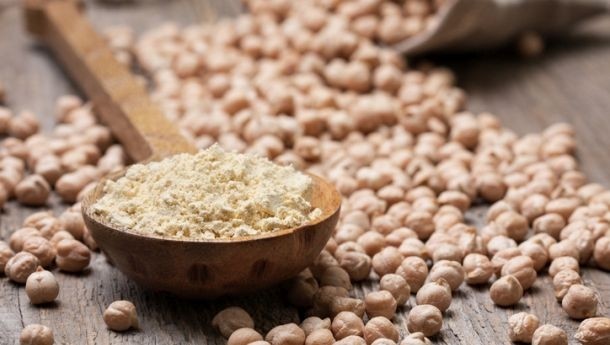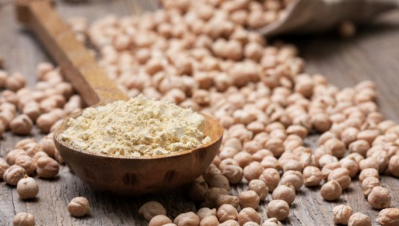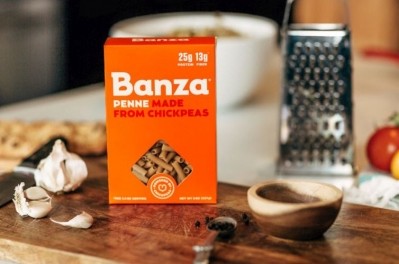Move aside peas... chickpea protein has just as much potential, claims Israeli start-up

The brainchild of Ram Reifen MD, MSc Nutrition, MBA – professor of human nutrition at the Hebrew University of Jerusalem and director of its center for nutrigenomics and functional foods - CHiCK.P has secured initial funding from Agrinnovation, an agricultural venture capital fund that’s part of the university’s Yissum technology transfer arm.
Speaking to FoodNavigator-USA during a press trip to Israel organized by the Israel Export Institute, Professor Reifen said CHiCK.P had developed concentrates with 60-90% protein and isolates with 90%+ protein, and was now looking for a partner to whom it could license the technology to produce the proteins on a commercial scale (currently production is at pilot scale).
“The technology has undergone scale-up and optimization over the last six months in Germany with TTZ [a food research organization]. In parallel, we are negotiating with various strategic b2b partners in Israel, Europe and the US and samples of our product are being evaluated by various food companies for use in meat substitutes, dairy alternatives, beverages, pastries, snack, bars, and more.”
"The PDCAAS [a measure of protein quality] of chickpea protein is similar or slightly higher than pea protein, although there are a few drawbacks in this method, for example, the PDCAAS uses fecal rather than ileal estimates of protein digestibility."
Professor Ram Reifen
Owing to the way CHiCK.P's chickpea protein is processed, the company is also able to tailor its functionality, to some extent, towards specific applications (solubility, emulsifying, gelation), said professor Reifen.
He added: "Part of the uniqueness of our protein extraction process is that it enables us to remove the vast majority of the anti-nutritional factors in chickpeas, as well as remove the bitter taste that is typical to beans/legumes. The final product's taste is bland, allowing its use and implementation in a wide array of food products, without the need for masking any off-flavors by using sugars.
"In addition, as a super-pulse, apart from great protein, chickpeas contain additional ingredients such as fibers and carbs, which are separated and refined as well during the process."
Chickpea fiber, he noted, has prebiotic properties (it helps to feed good bacteria in the gut).
Chickpea protein works exceptionally well in meat analogs
He added: “I’ve actually been working on chickpea protein as an alternative to soy for 15 years because it’s non-allergenic, non-GMO, it tastes better than pea protein and has a better texture, and it has an excellent amino acid profile. What’s particularly exciting is that it works exceptionally well in meat analogs and things like mayonnaise [as an egg replacer], and delivers an outstanding bite. It has great functionality [emulsification, gelation, water absorption, heat stability, solubility, matrix formation, and visco-elasticity].”
Professor Reifen, a pediatrician, also believes chickpea protein – which contains all none essential amino acids (phenylalanine, valine, threonine, tryptophan, methionine, leucine, isoleucine, lysine, and histidine) could serve as a weaning food as an alternative to soy-based follow-on formulas.

Chickpea awareness
In the US, fast-growing brands such as Banza (chickpea pasta), neat (egg replacers, meat analogs and baking mixes) and Rule Breaker (chickpea brownies) have been waxing lyrical about the technical as well as nutritional properties of chickpeas for some time, while a growing number of brands from The Good Bean and Biena Foods to Hippeas now use chickpeas in snacks.
However, chickpea protein is still relatively unknown to food formulators as it’s not produced on a commercial scale by any of the major players in plant proteins, despite the fact that chickpeas are very widely grown and relatively cheap compared to some other potential new sources of plant-based protein.
Unlike pea protein, chickpea protein is bland-tasting, and works exceptionally well as a meat analog, claimed Professor Reifen, who secured a grant from the Israeli ministry of economy and industry to get the project off the ground before teaming up with Agrinnovation.
“We estimate the market potential to be 3-5% of the total soy protein market, which is expected to reach $8bn in 2024. Thus, we believe that within the next five years CHiCK.P’s revenues will reach $300m.”

















